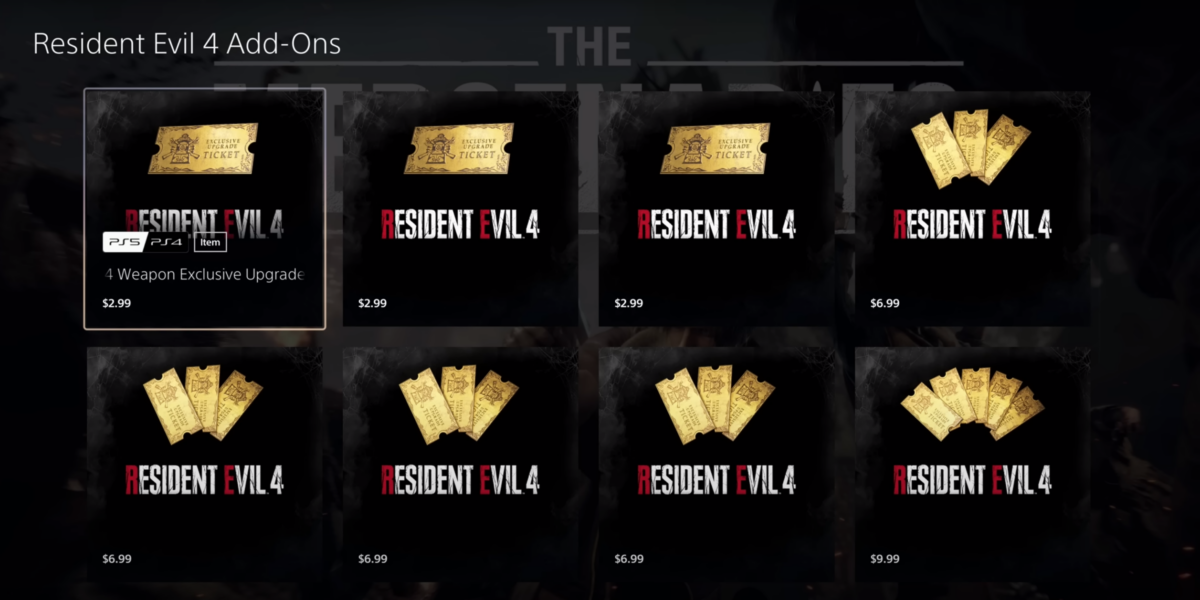
Resident Evil 4 Remake now has “time saver” microtransactions. But why do we need them if a game’s progression is balanced in the first place?
Resident Evil 4 Remake dropped on 24 March, 2023, to rapturous acclaim from pretty much everyone and anyone. Players, critics (including this very website), fans, your weird cousin who never leaves his flat; everyone was raving about it, sending it rocketing up Metacritic’s Best Games of 2023 list, where it currently sits in joint-second position alongside Tetris Effect Connected, and behind joint-leaders The Witcher 3: Wild Hunt – Complete Edition and Metroid Prime Remastered (funny how they’re almost all remakes, isn’t it?).
On 7 April – two weeks later, long after most reviews had gone live and on a UK and US public holiday, no less – Capcom quietly added a handful of new items to the game’s various digital storefronts. Described as “Weapon Exclusive Upgrade Tickets”, they were slotted in alongside RE4R's other microtransactions, which – at the time – were chiefly alternate costumes for Leon and Ashley. There are six in all, as well as five additional upgrade ticket bundles of various configurations, too. For £2.49, you get “access to a weapon’s exclusive upgrade at any time, regardless of the weapon’s level”, ultimately exchanging your real-life money for a fairly hefty real-life time saver.
That’s what they’re called these days, isn’t it? “Time savers”. Just as we became accustomed to “pre-order bonuses” and “cosmetic items”, “time savers” slowly tiptoed into the back of the room alongside them, becoming more and more widespread. It’s like the moment we became resigned to the fact that DLC’s a thing – we’re just giving you extra content, silly! – and then the microtransaction epidemic – there’s no in-game benefit! They’re just cosmetic! – time savers arrived and asked cosmetic gun skins to hold their beer.
Yes, I know, “time savers” are not anywhere in the same league as lootboxes. Unlike lootboxes – those insidious randomised things that are increasingly being banned across the world – there’s a tangible benefit for picking up a time saver microtransaction. Just how tangible it is – and how much someone is willing to pay for it – will vary from person to person, I guess. And in defence of Capcom – and that may well be the only time I type those words today, by the way – it’s by no means the first, and absolutely not the last, publisher to sneak in additional paid content after the review dust has settled.
It’s really sly, though, isn’t it? That’s the bit that makes me uneasy. We all know that gaming is as tribal as it is cultural; you may not agree with it, but there’s no denying that we support certain studios and publishers because they share our ideals and beliefs. Maybe they publicly denounce crunch culture, or are committed to telling inclusive stories, but those shared values influence our support for a studio every bit as much as their ability to forge our favourite make-believe worlds.

Credit: Capcom.
Consequently, some players are principled. They take a stand and boycott certain games and studios for all manner of reasons. And I know plenty of people – both in the industry and outside it – who consciously avoid games with lootboxes and microtransactions. But by quietly introducing microtransactions two weeks after release – and almost a month after its review embargo – Capcom took away that player agency. They can’t take a stand against a publisher that pushes microtransactions if the microtransactions weren’t in the game in the first place; and that feels particularly egregious.
You see, there are 21 weapons in Resident Evil 4 Remake that boast an exclusive upgrade perk. That means that a very time-poor player (which is most of us these days, surely) will need to cough up £52 if they’d prefer to avoid Spinel farming altogether and pick up the time saver ticket for every one of them. No, I don’t suppose many people will be tempted to pay that kind of money for the entire set, but then I don’t suppose Capcom is banking many will, either. It is, however, likely hoping that millions of us will be tempted to buy “just” one or two.
Perhaps most interestingly of all, though, Resident Evil 4 Remake's late introduction of microtransactions don’t even feature as part of Capcom’s £16 Resident Evil 4 Extra DLC Pack. That pack released alongside the game in March and – at the time, anyway – was the perfect addition for passionate completionists who wanted to pick up all the additional content with one easy click. Fast-forward two weeks, however, and suddenly, it’s out of date, and players who thought they’d picked up all the DLC find out they need to fork out significantly more if they want it all.
In news unlikely to surprise you, Capcom’s devious sleight-of-hand has divided its community. Half will once again attest that there’s no tangible pay-to-win benefit here, and if people want to drop their hard-earned cash to circumvent an in-game slog, let them. Others, however, have jumped onto social media to share their dismay (and given RE4R's Metacritic score a battering whilst they’re at it, too) and insist that the new premium content will make it much easier for some to zip through on Professional difficulty, which means it is a pay-to-win mechanic.
Personally, I can’t help but wonder why a publisher would sell time saver shortcuts if it hadn’t in some way sanctioned a progression system to make it a bit of a slog in the first place… and that’s surely the most troubling bit of all.
Vikki Blake has a column every week here at whynow Gaming. You can read her previous dispatch here.





